
'Limping in' is like bringing a knife to a gunfight...

Texas Hold 'Em is the version of Poker played in many casinos, and seen on the Challenge TV's World Poker Tour and The World Series of Poker. We play No Limit Texas Hold 'Em, viewed by many as being 'the cadillac of poker'. It's called 'No Limit' because there is NO LIMIT to the amount a player can bet when it is his/her turn to 'act'. At any point a player may declare themselves as being 'All In' and move all the chips they have in front of them. These are the basic rules for No Limit Texas Hold 'Em Poker.

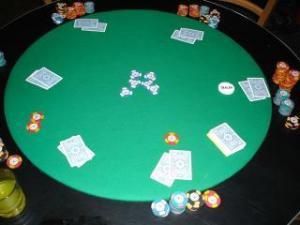 Most Texas Hold 'Em Poker games start with the two players to the left of the dealer putting a predetermined amount of money into the pot prior to cards being dealt. These 'forced' bets (or 'blinds') ensure that there is always something to play for on every hand. At later stages in the game the Blind amounts can be large enough to force the action in the hand. Most Texas Hold 'Em Poker games start with the two players to the left of the dealer putting a predetermined amount of money into the pot prior to cards being dealt. These 'forced' bets (or 'blinds') ensure that there is always something to play for on every hand. At later stages in the game the Blind amounts can be large enough to force the action in the hand.
"OK, I know I'M in this time...who's shy?"
The placing of these predetermined bets is called "posting the blinds." Most often, the "first blind" - the player immediately to the left of the dealer - puts up half the minimum bet, and the "second blind" puts up the full minimum bet. These are called the Small Blind (SB) and the Big Blind (BB) respectively. The amounts of the blinds increase gradually as play commences according to the Blinds Structure. In many games in addition to the blinds all players also post 'antes' which are smaller forced bets also placed into the pot to encourage action (we play antes and blinds).

 Players can take it in turn to deal but very often a dealer is elected (Andy T!) and a round disc - known as a "dealer button" - moves clockwise from player to player with each hand. The Button marks which player would be the dealer if the deal were advanced from player to player. Typically the player to the LEFT of the dealer would shuffle the cards (a standard 52-card deck) and the player to his RIGHT would cut before the deal commences. Players can take it in turn to deal but very often a dealer is elected (Andy T!) and a round disc - known as a "dealer button" - moves clockwise from player to player with each hand. The Button marks which player would be the dealer if the deal were advanced from player to player. Typically the player to the LEFT of the dealer would shuffle the cards (a standard 52-card deck) and the player to his RIGHT would cut before the deal commences.
Keeps your breath minty fresh too

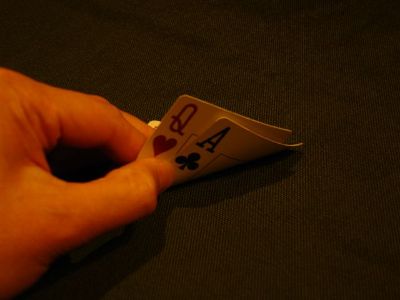 Each player is dealt two opening cards, face down, known as their 'openers', 'hole' or 'pocket' cards, and the first round of betting begins. Action, or betting, begins with the player to the left of the two who posted the blinds. This position of being 'first to speak' is known as being 'Under The Gun (UTG). Players can call, raise, or fold when it comes their turn to 'act'. Each player is dealt two opening cards, face down, known as their 'openers', 'hole' or 'pocket' cards, and the first round of betting begins. Action, or betting, begins with the player to the left of the two who posted the blinds. This position of being 'first to speak' is known as being 'Under The Gun (UTG). Players can call, raise, or fold when it comes their turn to 'act'.
Ace-Queen offsuit - the '2-7 hand'...
Knowing what hole cards to play in what position (and against what opposition!) is fundamental to playing succesful Texas Hold 'Em. Generally speaking you would not want to open from Early Position without a strong hand, because so many players are yet to act behind you and you may find yourself being re-raised and having to throw your hand away. In Late Position your starting requirements can be somewhat looser, especially if no-one has brought it in for a raise by the time action comes round to you.
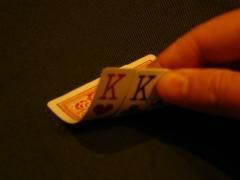 In an aggressive game the hand could well be over in the pre-flop betting stage (i.e. the 'flop' is not even seen) but usually these initial bets just serve to narrow the field for the later stages. As a very general rule of thumb Ace-Paint is usually playable, as are the higher pairs (9s and above). Knowing just how much to raise is also another key element to the game. In an aggressive game the hand could well be over in the pre-flop betting stage (i.e. the 'flop' is not even seen) but usually these initial bets just serve to narrow the field for the later stages. As a very general rule of thumb Ace-Paint is usually playable, as are the higher pairs (9s and above). Knowing just how much to raise is also another key element to the game.
Pocket 'Cowboys'..."RAISE"
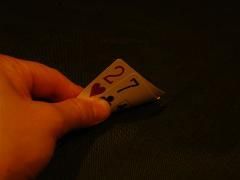 Pocket Aces are clearly the strongest openers in texas Hold 'Em. Having said that most people have their own favourite (or just plain lucky) openers for whatever reason. In our example Player 1 has A-Q offsuit which, whilst not one of the best hands you could open with, is certainly playable from most positions. Player 2, however, has pocket Kings. Nice.... Pocket Aces are clearly the strongest openers in texas Hold 'Em. Having said that most people have their own favourite (or just plain lucky) openers for whatever reason. In our example Player 1 has A-Q offsuit which, whilst not one of the best hands you could open with, is certainly playable from most positions. Player 2, however, has pocket Kings. Nice....
7-2 Offsuit, or 'The Hammer'
It's interesting to note that many openers have their own unique names (10-2, for instance is called a 'Doyle Brunson', because Doyle won the WSOP twice with those exact same cards!) - if you want to some of the common ones have a trawl through the glossary here.
Once all players have either contributed an equal amount to the pot or folded, the first three 'community' cards are dealt. This is called 'The Flop'.

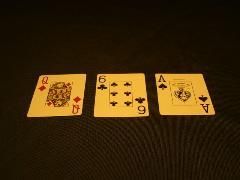 After the first round of betting, the dealer discards the top card of the deck. This is called 'burning' the card and is done to help prevent cheating. The dealer then flips the next three cards face up on the table for everyone to see. These are the first three of what will be a total of five 'community' cards which will eventually be placed face up on the table. After the first round of betting, the dealer discards the top card of the deck. This is called 'burning' the card and is done to help prevent cheating. The dealer then flips the next three cards face up on the table for everyone to see. These are the first three of what will be a total of five 'community' cards which will eventually be placed face up on the table.
"Queen, Six, Ace...."
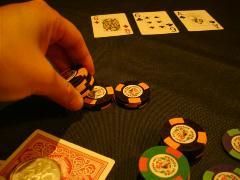 The above is an example of a typical flop - Qd, 6c and As - a 'rainbow' flop, so called because it is made up of three different suits. After the flop, another round of betting takes place, beginning this time with the player to the immediate left of the Dealer Button (e.g. if they had not yet folded pre-flop this 'next to act' player would be the Small Blind). The above is an example of a typical flop - Qd, 6c and As - a 'rainbow' flop, so called because it is made up of three different suits. After the flop, another round of betting takes place, beginning this time with the player to the immediate left of the Dealer Button (e.g. if they had not yet folded pre-flop this 'next to act' player would be the Small Blind).
"500....must be a peach of a hand...
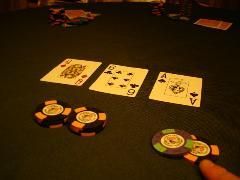 Players can check, call, raise, or fold when it is their turn to act, but should always wait until it is their turn before doing anything. Player 1 has made Top Two Pair on this flop, so is in a good shape, and bets out. Player 2, with pocket Kings, might well be worried by the appearance of the Ace here, and some might well choose to re-raise here to 'see where they are at', but our Player 1 opts to just 'flat call'. Players can check, call, raise, or fold when it is their turn to act, but should always wait until it is their turn before doing anything. Player 1 has made Top Two Pair on this flop, so is in a good shape, and bets out. Player 2, with pocket Kings, might well be worried by the appearance of the Ace here, and some might well choose to re-raise here to 'see where they are at', but our Player 1 opts to just 'flat call'.
"Let's see the Turn..."

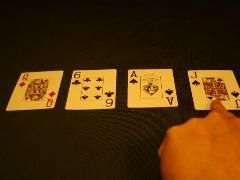 When all remaining players have contributed an equal amount to the pot the dealer 'burns' another card and places the next card face up onto the table. This, the fourth community card, is called 'Fourth Street', or more commonly, 'The Turn'. Action begins again with the player immediately to the left of the dealer (the button) beginning the third round of betting. When all remaining players have contributed an equal amount to the pot the dealer 'burns' another card and places the next card face up onto the table. This, the fourth community card, is called 'Fourth Street', or more commonly, 'The Turn'. Action begins again with the player immediately to the left of the dealer (the button) beginning the third round of betting.
A scary-looking board developing...
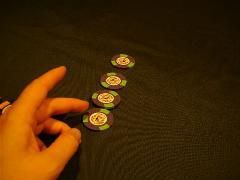 As before players can check, call, raise, or fold when it is their turn to act. Betting after the Turn card can often get quite lively, especially when any 2 cards on the board are of the same suit. Any players with a pair or 2 pair at this stage will often try and 'shut out' those players who are on draws by betting heavily and not giving their opponents the correct 'pot odds' to continue. As before players can check, call, raise, or fold when it is their turn to act. Betting after the Turn card can often get quite lively, especially when any 2 cards on the board are of the same suit. Any players with a pair or 2 pair at this stage will often try and 'shut out' those players who are on draws by betting heavily and not giving their opponents the correct 'pot odds' to continue.
"Let's make it a bit more interesting"
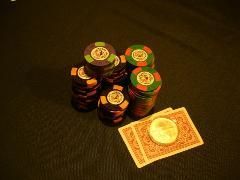 Generally speaking players who stay in the game at the Turn Card stage will either have a strong hand that is a favorite to win or be drawing to a winning hand such as a flush, straight or full house when the next card falls. Our Turn card is a Js. Player 1 still has the lead with his Top Two Pair, but Player 2 now has a Straight Draw, needing a 10 to complete his hand, or another King to make 'trips'. He calls . Generally speaking players who stay in the game at the Turn Card stage will either have a strong hand that is a favorite to win or be drawing to a winning hand such as a flush, straight or full house when the next card falls. Our Turn card is a Js. Player 1 still has the lead with his Top Two Pair, but Player 2 now has a Straight Draw, needing a 10 to complete his hand, or another King to make 'trips'. He calls .
"Plenty more where that came from..."

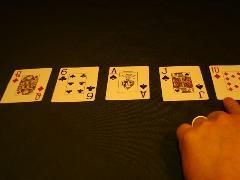 Another 'burn' card and then the final community card, called 'the River' or 'Fifth Street'. Players can now use any combination of seven cards - the five community cards and the two cards known only to them - to form the best possible five-card Poker hand as denoted by the Hand Rankings. The fourth and final round of betting starts, the player to the left of the dealer (the button) being first to act. Another 'burn' card and then the final community card, called 'the River' or 'Fifth Street'. Players can now use any combination of seven cards - the five community cards and the two cards known only to them - to form the best possible five-card Poker hand as denoted by the Hand Rankings. The fourth and final round of betting starts, the player to the left of the dealer (the button) being first to act.
And a Ten on the River...
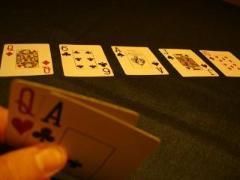 On the River card you know exactly what you have. If you were drawing to a hand you know whether you were successful or not. If you missed your hand you'll be trying to decide whether a bluff is possible or whether you should fold. Unless you believe your hand to be 'good' a call to a bet after the River is indavisable. On the River card you know exactly what you have. If you were drawing to a hand you know whether you were successful or not. If you missed your hand you'll be trying to decide whether a bluff is possible or whether you should fold. Unless you believe your hand to be 'good' a call to a bet after the River is indavisable.
"Eep."
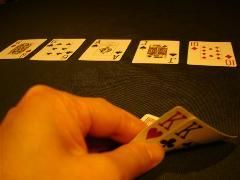 Here the river is a 10d, giving Player 2, holding the 2 Kings, a 'Broadway Straight' (being A,K,Q,J,10 of any suit), and as Vince Van Patten might say 'showtunes are going off in his head'. For Player 1, still with Top Two Pair, the 10 is definitely a 'scare card' as he knows that any player holding a King has him beat, and the likelihood is good that any player still in the pot could well be holding one. Here the river is a 10d, giving Player 2, holding the 2 Kings, a 'Broadway Straight' (being A,K,Q,J,10 of any suit), and as Vince Van Patten might say 'showtunes are going off in his head'. For Player 1, still with Top Two Pair, the 10 is definitely a 'scare card' as he knows that any player holding a King has him beat, and the likelihood is good that any player still in the pot could well be holding one.
"Bingo, bango, bongo....."

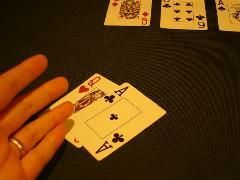 After the final (quite often very big) round of betting, all players who remain in the game reveal their hands. Traditionally the player who made the inital bet or the player who made the last raise shows their hand first, and the player with the best hand wins. Losers are not required to show their losing hand, and can discard them if they wish. This is called 'mucking' your cards. After the final (quite often very big) round of betting, all players who remain in the game reveal their hands. Traditionally the player who made the inital bet or the player who made the last raise shows their hand first, and the player with the best hand wins. Losers are not required to show their losing hand, and can discard them if they wish. This is called 'mucking' your cards.
"Ace-Queen any good?"
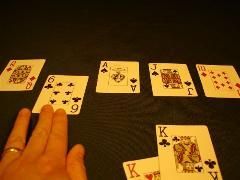 In our example Player 1 won the hand with his Broadway Straight. Note that he only plays one of his Kings (see right), the best possible hand being A,K,Q,J,10 - the six of clubs is not played. Player 1, who held AQ offsuit, was favourite all the way with his flopped Aces and Queens. The River can be a blessing or a curse. He opts to show his losing hand at the showdown. In our example Player 1 won the hand with his Broadway Straight. Note that he only plays one of his Kings (see right), the best possible hand being A,K,Q,J,10 - the six of clubs is not played. Player 1, who held AQ offsuit, was favourite all the way with his flopped Aces and Queens. The River can be a blessing or a curse. He opts to show his losing hand at the showdown.
"Nope."
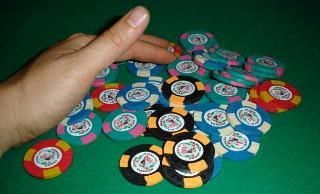 These are the basics of how to play Texas Hold 'Em, but as anyone who has ever played me will tell you, I'm no expert. Hold 'Em is a lot more intricate than just betting on the cards in front of you - you're also playing the people, and a myriad of other factors come into play. These are the basics of how to play Texas Hold 'Em, but as anyone who has ever played me will tell you, I'm no expert. Hold 'Em is a lot more intricate than just betting on the cards in front of you - you're also playing the people, and a myriad of other factors come into play.
One of the best things about playing poker....
Things like your chip holding, position relative to the dealer, table 'image', your mood on the day, and of course whether you're just catching cards at the time, all combine to determine whether the end of the game will see you a winner or just another Johnny Longpockets going round the table asking everyone to lend you Bus Fare Home. As Mike Sexton is fond of saying, Hold 'Em is a game that "takes ten minute to learn and a lifetime to master". Never a truer bloody word Mike. Should have gone to Specsavers...
The Hendon Mob have a simple interactive guide to Hold 'Em here which I recommend all players who are new to the game to have a butcher's at.
NEW - Odds calculator - a great little tool on the cardplayer.com site which allows you to calculate your odds of being ahead after the flop or winning on the river. Genius!
- "Behold the power of the Beer Hand!" -
| 





 Most Texas Hold 'Em Poker games start with the two players to the left of the dealer putting a predetermined amount of money into the pot prior to cards being dealt. These 'forced' bets (or 'blinds') ensure that there is always something to play for on every hand. At later stages in the game the Blind amounts can be large enough to force the action in the hand.
Most Texas Hold 'Em Poker games start with the two players to the left of the dealer putting a predetermined amount of money into the pot prior to cards being dealt. These 'forced' bets (or 'blinds') ensure that there is always something to play for on every hand. At later stages in the game the Blind amounts can be large enough to force the action in the hand.
 Players can take it in turn to deal but very often a dealer is elected (Andy T!) and a round disc - known as a "dealer button" - moves clockwise from player to player with each hand. The Button marks which player would be the dealer if the deal were advanced from player to player. Typically the player to the LEFT of the dealer would shuffle the cards (a standard 52-card deck) and the player to his RIGHT would cut before the deal commences.
Players can take it in turn to deal but very often a dealer is elected (Andy T!) and a round disc - known as a "dealer button" - moves clockwise from player to player with each hand. The Button marks which player would be the dealer if the deal were advanced from player to player. Typically the player to the LEFT of the dealer would shuffle the cards (a standard 52-card deck) and the player to his RIGHT would cut before the deal commences.
 Each player is dealt two opening cards, face down, known as their 'openers', 'hole' or 'pocket' cards, and the first round of betting begins. Action, or betting, begins with the player to the left of the two who posted the blinds. This position of being 'first to speak' is known as being 'Under The Gun (UTG). Players can call, raise, or fold when it comes their turn to 'act'.
Each player is dealt two opening cards, face down, known as their 'openers', 'hole' or 'pocket' cards, and the first round of betting begins. Action, or betting, begins with the player to the left of the two who posted the blinds. This position of being 'first to speak' is known as being 'Under The Gun (UTG). Players can call, raise, or fold when it comes their turn to 'act'.  In an aggressive game the hand could well be over in the pre-flop betting stage (i.e. the 'flop' is not even seen) but usually these initial bets just serve to narrow the field for the later stages. As a very general rule of thumb Ace-Paint is usually playable, as are the higher pairs (9s and above). Knowing just how much to raise is also another key element to the game.
In an aggressive game the hand could well be over in the pre-flop betting stage (i.e. the 'flop' is not even seen) but usually these initial bets just serve to narrow the field for the later stages. As a very general rule of thumb Ace-Paint is usually playable, as are the higher pairs (9s and above). Knowing just how much to raise is also another key element to the game. Pocket Aces are clearly the strongest openers in texas Hold 'Em. Having said that most people have their own favourite (or just plain lucky) openers for whatever reason. In our example Player 1 has A-Q offsuit which, whilst not one of the best hands you could open with, is certainly playable from most positions. Player 2, however, has pocket Kings. Nice....
Pocket Aces are clearly the strongest openers in texas Hold 'Em. Having said that most people have their own favourite (or just plain lucky) openers for whatever reason. In our example Player 1 has A-Q offsuit which, whilst not one of the best hands you could open with, is certainly playable from most positions. Player 2, however, has pocket Kings. Nice....
 After the first round of betting, the dealer discards the top card of the deck. This is called 'burning' the card and is done to help prevent cheating. The dealer then flips the next three cards face up on the table for everyone to see. These are the first three of what will be a total of five 'community' cards which will eventually be placed face up on the table.
After the first round of betting, the dealer discards the top card of the deck. This is called 'burning' the card and is done to help prevent cheating. The dealer then flips the next three cards face up on the table for everyone to see. These are the first three of what will be a total of five 'community' cards which will eventually be placed face up on the table.  The above is an example of a typical flop - Qd, 6c and As - a 'rainbow' flop, so called because it is made up of three different suits. After the flop, another round of betting takes place, beginning this time with the player to the immediate left of the Dealer Button (e.g. if they had not yet folded pre-flop this 'next to act' player would be the Small Blind).
The above is an example of a typical flop - Qd, 6c and As - a 'rainbow' flop, so called because it is made up of three different suits. After the flop, another round of betting takes place, beginning this time with the player to the immediate left of the Dealer Button (e.g. if they had not yet folded pre-flop this 'next to act' player would be the Small Blind).  Players can check, call, raise, or fold when it is their turn to act, but should always wait until it is their turn before doing anything. Player 1 has made Top Two Pair on this flop, so is in a good shape, and bets out. Player 2, with pocket Kings, might well be worried by the appearance of the Ace here, and some might well choose to re-raise here to 'see where they are at', but our Player 1 opts to just 'flat call'.
Players can check, call, raise, or fold when it is their turn to act, but should always wait until it is their turn before doing anything. Player 1 has made Top Two Pair on this flop, so is in a good shape, and bets out. Player 2, with pocket Kings, might well be worried by the appearance of the Ace here, and some might well choose to re-raise here to 'see where they are at', but our Player 1 opts to just 'flat call'. 
 When all remaining players have contributed an equal amount to the pot the dealer 'burns' another card and places the next card face up onto the table. This, the fourth community card, is called 'Fourth Street', or more commonly, 'The Turn'. Action begins again with the player immediately to the left of the dealer (the button) beginning the third round of betting.
When all remaining players have contributed an equal amount to the pot the dealer 'burns' another card and places the next card face up onto the table. This, the fourth community card, is called 'Fourth Street', or more commonly, 'The Turn'. Action begins again with the player immediately to the left of the dealer (the button) beginning the third round of betting.  As before players can check, call, raise, or fold when it is their turn to act. Betting after the Turn card can often get quite lively, especially when any 2 cards on the board are of the same suit. Any players with a pair or 2 pair at this stage will often try and 'shut out' those players who are on draws by betting heavily and not giving their opponents the correct 'pot odds' to continue.
As before players can check, call, raise, or fold when it is their turn to act. Betting after the Turn card can often get quite lively, especially when any 2 cards on the board are of the same suit. Any players with a pair or 2 pair at this stage will often try and 'shut out' those players who are on draws by betting heavily and not giving their opponents the correct 'pot odds' to continue.  Generally speaking players who stay in the game at the Turn Card stage will either have a strong hand that is a favorite to win or be drawing to a winning hand such as a flush, straight or full house when the next card falls. Our Turn card is a Js. Player 1 still has the lead with his Top Two Pair, but Player 2 now has a Straight Draw, needing a 10 to complete his hand, or another King to make 'trips'. He calls .
Generally speaking players who stay in the game at the Turn Card stage will either have a strong hand that is a favorite to win or be drawing to a winning hand such as a flush, straight or full house when the next card falls. Our Turn card is a Js. Player 1 still has the lead with his Top Two Pair, but Player 2 now has a Straight Draw, needing a 10 to complete his hand, or another King to make 'trips'. He calls . 
 Another 'burn' card and then the final community card, called 'the River' or 'Fifth Street'. Players can now use any combination of seven cards - the five community cards and the two cards known only to them - to form the best possible five-card Poker hand as denoted by the
Another 'burn' card and then the final community card, called 'the River' or 'Fifth Street'. Players can now use any combination of seven cards - the five community cards and the two cards known only to them - to form the best possible five-card Poker hand as denoted by the  On the River card you know exactly what you have. If you were drawing to a hand you know whether you were successful or not. If you missed your hand you'll be trying to decide whether a bluff is possible or whether you should fold. Unless you believe your hand to be 'good' a call to a bet after the River is indavisable.
On the River card you know exactly what you have. If you were drawing to a hand you know whether you were successful or not. If you missed your hand you'll be trying to decide whether a bluff is possible or whether you should fold. Unless you believe your hand to be 'good' a call to a bet after the River is indavisable.  Here the river is a 10d, giving Player 2, holding the 2 Kings, a 'Broadway Straight' (being A,K,Q,J,10 of any suit), and as
Here the river is a 10d, giving Player 2, holding the 2 Kings, a 'Broadway Straight' (being A,K,Q,J,10 of any suit), and as 
 After the final (quite often very big) round of betting, all players who remain in the game reveal their hands. Traditionally the player who made the inital bet or the player who made the last raise shows their hand first, and the player with the best hand wins. Losers are not required to show their losing hand, and can discard them if they wish. This is called 'mucking' your cards.
After the final (quite often very big) round of betting, all players who remain in the game reveal their hands. Traditionally the player who made the inital bet or the player who made the last raise shows their hand first, and the player with the best hand wins. Losers are not required to show their losing hand, and can discard them if they wish. This is called 'mucking' your cards.  In our example Player 1 won the hand with his Broadway Straight. Note that he only plays one of his Kings (see right), the best possible hand being A,K,Q,J,10 - the six of clubs is not played. Player 1, who held AQ offsuit, was favourite all the way with his flopped Aces and Queens. The River can be a blessing or a curse. He opts to show his losing hand at the showdown.
In our example Player 1 won the hand with his Broadway Straight. Note that he only plays one of his Kings (see right), the best possible hand being A,K,Q,J,10 - the six of clubs is not played. Player 1, who held AQ offsuit, was favourite all the way with his flopped Aces and Queens. The River can be a blessing or a curse. He opts to show his losing hand at the showdown.  These are the basics of how to play Texas Hold 'Em, but as anyone who has ever played me will tell you, I'm no expert. Hold 'Em is a lot more intricate than just betting on the cards in front of you - you're also playing the people, and a myriad of other factors come into play.
These are the basics of how to play Texas Hold 'Em, but as anyone who has ever played me will tell you, I'm no expert. Hold 'Em is a lot more intricate than just betting on the cards in front of you - you're also playing the people, and a myriad of other factors come into play.